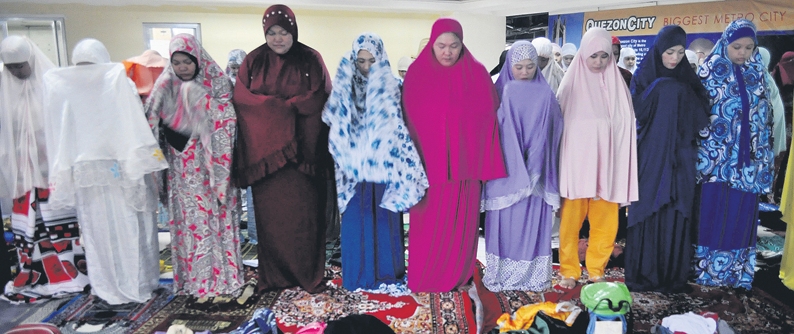
FEAST OF SACRIFICE Muslim women for peace during the celebration of the Eid’l Adha, the Islamic Feast of Sacrifice, at the Quezon City Hall. Similar gatherings were held in Muslim communities in the country. ARNOLD ALMACEN
Millions of Muslims converged early Sunday for the Eid’l Adha (The Feast of Sacrifice) prayers in open fields as religious leaders across the globe called for world peace.
President Benigno Aquino III has declared Monday an official nonworking holiday in recognition of the occasion’s significance to world peace. It also coincides with the opening of the 2011 hajj pilgrimage to Mecca.
Filipino Muslims trooped to morning congregational prayers at designated open spaces in key Mindanao cities, as well as in Metro Manila’s three major Muslim communities in Quiapo, Manila, Taguig City and Tandang Sora Avenue in Quezon City.
In Cotabato City, Mayor Japal Guiani Jr. opened the grounds of the People’s Palace (City Hall).
Governor Ansaruddin Adiong did the same in the city’s Autonomous Region in Muslim Mindanao Complex for Islamic congregational prayers on Eid’l Adha.
Ustadz Jaafar Ali, head of the Ulama Council of the Philippines based in Cotabato City, called on Filipino Muslims to pray for the swift resolution of the Muslim Mindanao conflict.
Overseas, Imam Abd Namous of the New York Islamic Cultural Center said extremism had done more harm than good to the world’s Muslims and appealed to majority conservatives to renounce terrorism.
In Washington D.C., Dr. Yahya Hendi, the imam and director of Muslim chaplaincy at Georgetown University, urged Muslims all over the world to pursue a continuing dialogue to build peace with other religions, saying it made no sense to fight over differences in beliefs.
Hendi last week explained to visiting journalists from seven countries the importance of Eid’l Adha in bridging understanding among the world’s Abrahamic religions—Judaism, Christianity and Islam.
Rabbi Rashel Gartner, director of Jewish chaplaincy at Georgetown University, told the Inquirer that leaders of the Abrahamic religions in the 200-year Catholic school support efforts on interfaith dialogue.
To Muslims, the tradition of celebrating Eid’l Adha and performing the yearly hajj originated from the story of Abraham, his family and people as told in the Bible’s Book of Genesis and the Qur’an.
As part of the tradition, the slaughtering of a goat or sacrificial lamb is prescribed for each pilgrim or family in thanksgiving for God saving Abraham’s family.